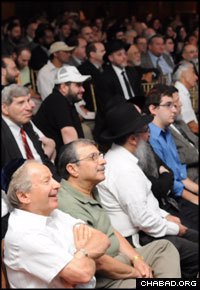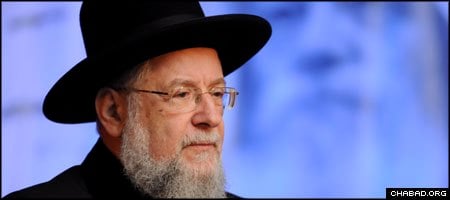In June 1994, Rabbi Israel Meir Lau – then, the Chief Rabbi of Israel – joined the hundreds of Israelis who flew to New York for the funeral of the Rebbe, Rabbi Menachem Mendel Schneerson, of righteous memory.
“It was silent, very still,” he recalled. “No one said a word. One of the Chasidim from Kfar Chabad, about 80 years old, walked a little before me and, all of a sudden, he screamed out, lifting his hands to heaven. He said only one word: tatte.”
Much has been said about the deep connection between the Rebbe and his Chasidim, but Lau used this memory of an elder follower screaming out “father” in Yiddish to begin an address that captured much more: the Rebbe’s profound love for the Jewish people and all of humanity.
Speaking in Philadelphia at the June 23 “Evening of Inspiration” event organized by Chabad-Lubavitch emissaries across the Delaware Valley, Lau told stories illustrative of the Rebbe’s continuing influence.
More than 1,000 people attended the Philadelphia event, one of many similar-themed functions that have taken place in the days and weeks leading up to the 14th anniversary of the Rebbe’s passing. As in prior years, an expected tens of thousands of people, representing all segments of Jewish life, will line up July 6 – on the Hebrew calendar, the date is 3 Tammuz – to pray at the Rebbe’s holy resting place at the Old Montefiore Cemetery in Cambria Heights, N.Y.
The former Israeli Chief Rabbi was introduced by Rabbi Avraham Shemtov, director of Philadelphia’s Lubavitcher Center. In his remarks, Shemtov asserted the sense of mission felt by so many people around the world because of the Rebbe’s teachings.
“The Rebbe said that it is our responsibility to see that no Jew goes without Judaism, that no Jew is lost,” said Shemtov.
Lau – who also addressed the Detroit dinner hosted by Chabad-Lubavitch of Michigan that drew another 1,000 people the night before – told of a visit he made to an old man in Moscow in the late 1980s. The man, named Baruch, had a daughter who married a non-Jew. Infused with the spirit of self-sacrifice elaborated upon time and again in the Rebbe’s public talks, the man refused to move to Israel. He was the only connection to Judaism that his grandchildren would have, he said.
“When they come to visit me,” Baruch told Lau, “I teach and say with them the Shema,” the Jewish prayer affirming G‑d’s unity recited twice each day.
“They know about Rabbi Akiva already,” Baruch continued. “They know what Jerusalem is. They know I have a Rebbe, and they know stories about the Rebbe.
“You want me to go with you?” the man asked. “Then who will tell my children that they are Jewish?”

Turning from that account, which drew tears among many in the audience, Lau spoke of his first visit to the Rebbe, which happened just after the Yom Kippur War, in 1973. During the meeting, the Rebbe inquired about how the Israeli people were dealing with what ultimately was a victory, but revealed the precarious position the state occupied in the Middle East.
Lau told the Rebbe about an emergency phone call he received in Tel Aviv on the second night of the war. A man on the other end begged him to travel through the blacked-out city to perform a wedding. Lau acceded to the request, and right after the ceremony, the groom left to join his unit in the fighting.
The groom’s mother confessed to Lau, “if he will not come back, I will commit suicide.” Taken aback, Lau asked her for an explanation. The woman’s family had been slaughtered during the Holocaust in Auschwitz, and she had wandered Poland for several years, searching for her family. She married a young man, and the couple were among the first to move to the new state of Israel in 1948.
Almost immediately, the War for Independence demanded that the young husband go to fight, despite the fact that his bride was pregnant. He fought in Latrun, Gush Etzion and Jerusalem before being killed in combat.
Now, the woman’s son was facing an uncertain fate.
“You are a survivor who will understand,” the woman told Lau, who survived the Holocaust. “Pray for me.”
At that point in the conversation, Lau said, the Rebbe cried. Lau was surprised at such sensitivity shown for a woman thousands of miles away.
“So now,” Lau said to the Philadelphia audience. “You understand the crying out of a Chasid, crying out ‘tatte!’ ”
Afterwards, audience members milled about in groups, sampling from a dessert buffet set up in the ballroom of the Crystal Tea Room in the historic Wanamaker Building.
Attorney Neil Kerzner remarked that “heading from one story to another was amazing. The last one encapsulated the whole message.”
Aviel Nisimi agreed.
“The inspiration tonight,” he said, “should drive us to achieve our highest potential.”





Start a Discussion